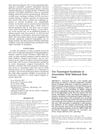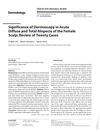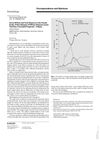 49 citations,
January 2004 in “Dermatology”
49 citations,
January 2004 in “Dermatology” Men with a family history of hair loss are more likely to experience it themselves, especially if both parents have hair loss.
 48 citations,
January 2000 in “Hormone Research in Paediatrics”
48 citations,
January 2000 in “Hormone Research in Paediatrics” Cytokines and neuropeptides are key in controlling androgen levels, affecting skin and hair conditions.
 45 citations,
March 2003 in “Pediatrics”
45 citations,
March 2003 in “Pediatrics” Baby's toe injury linked to mom's hair loss; check baby's toes and be careful with fruit gel snacks.
 45 citations,
January 1999 in “Dermatology”
45 citations,
January 1999 in “Dermatology” The VQ-Dermato is a reliable French questionnaire for measuring quality of life in chronic skin disorder patients.
 45 citations,
January 1992 in “Dermatology”
45 citations,
January 1992 in “Dermatology” Half of the patients treated with a specific drug for skin cancer experienced hair loss not related to the drug's dosage.
 44 citations,
January 2005 in “Dermatology”
44 citations,
January 2005 in “Dermatology” Hair problems can be caused by genetics or the environment, and treatment should focus on the cause and reducing hair damage.
 42 citations,
January 2008 in “Dermatology”
42 citations,
January 2008 in “Dermatology” Dermoscopy effectively distinguishes between acute total hair loss and other types of female hair loss.
 40 citations,
July 2013 in “Skin Pharmacology and Physiology”
40 citations,
July 2013 in “Skin Pharmacology and Physiology” Male skin gets drier and more alkaline as it ages, which may need different skincare than women's skin.
 40 citations,
January 2009 in “Skin Pharmacology and Physiology”
40 citations,
January 2009 in “Skin Pharmacology and Physiology” Fetal cells could improve skin repair with minimal scarring and are a potential ready-to-use solution for tissue engineering.
 40 citations,
January 1994 in “Skin Pharmacology and Physiology”
40 citations,
January 1994 in “Skin Pharmacology and Physiology” Male hormones affect oil-producing skin cells differently based on their body location, and the drug spironolactone can reduce these effects.
39 citations,
January 2013 in “Skin pharmacology and physiology” Nanoparticles show promise for drug delivery through hair follicles but not through healthy skin.
39 citations,
January 2012 in “Dermatology” Combining high-dose corticosteroids with methotrexate may be effective and safe for severe alopecia areata.
39 citations,
January 1991 in “Oncology” High-dose vitamin A was safe and well-tolerated in a lung cancer treatment study.
39 citations,
January 1980 in “Dermatology” Cyproterone acetate was effective in treating acne, hirsutism, and alopecia with few side effects.
 37 citations,
January 2004 in “Hormone Research in Paediatrics”
37 citations,
January 2004 in “Hormone Research in Paediatrics” About 3% of high school girls aged 14-18 in Isfahan, Iran, have polycystic ovary syndrome.
36 citations,
January 2012 in “Dermatology” Stopping gefitinib improved scalp condition in a woman with lung cancer.
36 citations,
December 2009 in “Skin pharmacology and physiology” Helium-neon laser treatment can stimulate hair growth in mice.
 33 citations,
January 2013 in “Dermatology”
33 citations,
January 2013 in “Dermatology” Over half of the adult women with acne in the study had higher than normal levels of male hormones, especially DHEA.
 32 citations,
September 2015 in “Dermatology”
32 citations,
September 2015 in “Dermatology” Certain leukemia drugs can cause severe skin reactions that may require stopping treatment.
 32 citations,
January 2010 in “Dermatology”
32 citations,
January 2010 in “Dermatology” Combining laser hair removal with topical eflornithine is recommended for better results in treating unwanted facial hair.
 32 citations,
January 2000 in “Skin pharmacology and physiology”
32 citations,
January 2000 in “Skin pharmacology and physiology” Certain substances that block a specific protein help promote hair growth.
30 citations,
January 2015 in “Dermatology” 308-nm excimer laser therapy helps regrow hair in alopecia areata.
30 citations,
January 1999 in “Dermatology” Cyclosporine A can help some people with severe alopecia areata regrow hair.
29 citations,
July 2011 in “Pediatrics in review” Accurate assessment of puberty using Tanner staging is crucial for identifying normal and abnormal development.
 29 citations,
January 2003 in “Dermatology”
29 citations,
January 2003 in “Dermatology” The condition called 'acute diffuse and total alopecia of the female scalp' is actually a known condition named alopecia areata incognita.
28 citations,
January 2016 in “Dermatology” Methotrexate with corticosteroids can effectively treat severe alopecia areata but often requires long-term maintenance.
 25 citations,
October 2015 in “Dermatology”
25 citations,
October 2015 in “Dermatology” Dapsone improved pustular psoriasis in patients who didn't respond to other treatments and is considered a well-tolerated option.
 25 citations,
January 2000 in “Hormone Research in Paediatrics”
25 citations,
January 2000 in “Hormone Research in Paediatrics” Mutations in the androgen receptor gene cause Androgen Insensitivity Syndrome, affecting sexual development.
 24 citations,
November 2015 in “Annals of Nutrition and Metabolism”
24 citations,
November 2015 in “Annals of Nutrition and Metabolism” Certain SHBG gene variants, like rs727428, are linked to higher testosterone levels in women with PCOS.
 23 citations,
January 1994 in “Skin Pharmacology and Physiology”
23 citations,
January 1994 in “Skin Pharmacology and Physiology” Hair loss in men and women is linked to high stress hormone levels and other hormonal imbalances, suggesting treatments should be customized to each person's hormones.




















